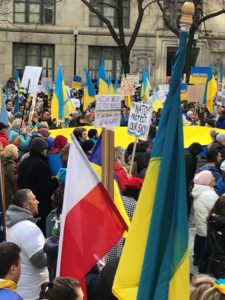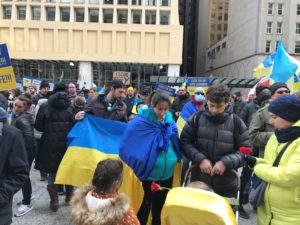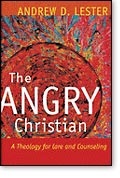This past Sunday, I attended a rally for Ukraine at Chicago’s downtown Daley Plaza. I am no expert at crowd counts, but it was clear that hundreds attended, filling most of the plaza. The point was painfully obvious: People were hugely upset with the unwarranted Russian invasion of Ukraine that began two weeks ago.
It is hard not to notice such things in Chicago, particularly on the near North Side. We live about one mile from a neighborhood known as Ukrainian Village. Chicago hosts the second-largest Ukrainian population in the U.S., estimated at 54,000. Many of us know or work with Ukrainian-American friends and colleagues. One of our daughters has a long-time friend from her junior college years. She talked to her recently and reported that, while Ivanka had talked to her frightened grandmother in Ukraine, she subsequently learned that her grandmother died in a Russian attack on her apartment building.
Welcome to Hell on Earth, Putin-style. Nothing is too brutal or inhumane if his personal power is at stake. Despite this savage reputation, well-earned in places like Syria, he has his admirers in the U.S., including a recent former president who shares an inability to put morality ahead of self-interest. Trump’s willingness to sacrifice Ukraine for the mere bauble of finding supposed dirt on Joe Biden surely provided a signal to Putin that Ukraine was fair game. The infamous telephone call between Trump and Ukrainian President Volodymyr Zalenskyy, of course, led to Trump’s impeachment, followed by a highly partisan acquittal in the U.S. Senate. Both Trump and Putin have massive amounts of blood on their hands. With more than 2 million Ukrainian refugees so far flowing into Eastern Europe, this is no time to be polite in saying so.
 My own awareness of the crisis is heightened by having been a political science major at Cleveland State University, where I indulged in Soviet and Russian history and learned a modest dose of the Russian language in a class half full of Ukrainian-Americans. That enabled me to read some of the signs at the rally that were not in English, though most were. One caught my eye: Русскийй Военный Кораблъ: Иди Нахуй. It was the challenging anatomical assignment that a Ukrainian commander on Snake Island threw back at a Russian warship that demanded his troops’ surrender. It seemed to sum up the sentiment on the Ukrainian side of the conflict.
My own awareness of the crisis is heightened by having been a political science major at Cleveland State University, where I indulged in Soviet and Russian history and learned a modest dose of the Russian language in a class half full of Ukrainian-Americans. That enabled me to read some of the signs at the rally that were not in English, though most were. One caught my eye: Русскийй Военный Кораблъ: Иди Нахуй. It was the challenging anatomical assignment that a Ukrainian commander on Snake Island threw back at a Russian warship that demanded his troops’ surrender. It seemed to sum up the sentiment on the Ukrainian side of the conflict.
Why was I there? Along with having donated $100 that Trip Advisor offered to match to support the efforts of World Central Kitchen to feed the mass of refugees at the Polish border, I felt it was the least I could do in a nation of comforts while millions of Ukrainians were being forced either to flee their homes or fight for them against a massive invading Russian army. That army has been finding, to Putin’s surprise, that Ukrainians are not inclined to surrender their sovereignty, especially in the face of massive human rights violations and war crimes. What awaits them if they surrender may be worse than the fight itself, so they will fight.
The issue is that, after reaching seemingly comfortable accommodations in recent decades with autocratic and authoritarian regimes in major nations like Russia and China, we collectively underestimated the potential malevolence of such leadership anywhere. It is certainly true that the United States alone, and even NATO and the European Union collectively, cannot hope to convert every nation in the world to democratic principles. Those are societal features that must be internalized by any culture that wishes to share a more enlightened world view. Whole books, particularly but not only by political scientists, have explored the necessary conditions for fostering such systems. In the past decade, even in the U.S., we have seen just how fragile democratic systems can be when faced with an onslaught of disinformation and the personality cults of those who offer simplistic answers to complex questions.
But the problem for Ukraine is different. Ukrainians had been steadily and deliberately working to steer their own society toward those principles, and President Volodymyr Zelenskyy represents a remarkable commitment by new and talented leadership to those ideals. The problem is that Ukraine is a former Soviet republic with an extensive Russian border, led by a neighboring leader who suffers from profound paranoia and a delusional belief in the glory of the former USSR. Putin is remarkably lacking in moral principle and empathy, and thus, it should be no surprise that, at the same time that he refers to Russians and Ukrainians as ethnic “brothers”, he is willing to kill his alleged brother in order to save him from Western-style democracy. It is the classic bear hug of an abusive older sibling whose only real concern is getting what he wants, no matter the cost in human lives and suffering. If they don’t love me, the thinking goes, I will make them wish that they did.
The concept of doing the hard work required to create a Russian society that is actually attractive to the outside world escapes him. After all, he does not even trust his own people with the truth. If he did, the Russian Duma would not have rubber-stamped legislation to impose 15-year prison sentences on those who tell the Russian people anything the Kremlin does not want them to hear—such as the simple fact that Russia has launched an unfathomably violent attack on a peaceful neighbor.
The challenge for America and the democracies of the world is to rise to the occasion and accept whatever sacrifice may be necessary to squeeze the Russian war machine dry of whatever resources it needs to maintain its grip on Ukraine, which could easily be followed with a bear hug of Moldova and other former Soviet republics and allies, possibly including some that have already joined NATO. That, of course, could trigger the insanity of world war. It is certainly the case that direct military confrontation between NATO and Russia may be highly inadvisable at the moment, given Russia’s nuclear arsenal and the possibility of increased irrationality by Putin if he senses that he is a trapped man. The stakes for the world in such a case are extremely high.
There are, nonetheless, numerous ways in which we can help and indeed already have helped, including provision of military weapons like anti-tank missiles and other vital supplies.
 The sudden withdrawal from Russia of major Western companies can also send a signal to Russian citizens, otherwise deprived of legitimate information, that the world is unwilling to tolerate Russian aggression. At the rally, for instance, one speaker noted that McDonald’s was still doing business in Russia. That is no longer true. Dozens of major U.S. corporations, including McDonald’s, are suspending business in Russia, although McDonald’s is paying its workers while the stores are closed. That move may be more powerful than simply withdrawing completely, by causing numerous workers to wonder about the logic of an American company paying them to stay home. Even AECOM, a major infrastructure and engineering consulting firm with which I have had some experience, has chosen to suspend operations in Russia. Eventually, Russia will have a difficult time replacing such expertise.
The sudden withdrawal from Russia of major Western companies can also send a signal to Russian citizens, otherwise deprived of legitimate information, that the world is unwilling to tolerate Russian aggression. At the rally, for instance, one speaker noted that McDonald’s was still doing business in Russia. That is no longer true. Dozens of major U.S. corporations, including McDonald’s, are suspending business in Russia, although McDonald’s is paying its workers while the stores are closed. That move may be more powerful than simply withdrawing completely, by causing numerous workers to wonder about the logic of an American company paying them to stay home. Even AECOM, a major infrastructure and engineering consulting firm with which I have had some experience, has chosen to suspend operations in Russia. Eventually, Russia will have a difficult time replacing such expertise.
No discomfort for America and even most of Europe, however, can even begin to approach that of the struggling, fighting Ukrainians in this moment. The last time the United States saw large numbers of war refugees wandering its own landscape was during the Civil War. Even the terrorist attacks of September 11, 2001, killed nearly 3,000 citizens in places of commerce or government, but those who fled returned to homes physically untouched by conflict. If we muster the will, we are capable of far more support for Ukraine in the present situation than most of us imagine. Are gasoline prices higher as a result of banning imports of Russian oil? Let’s find a way to handle it without turning it into a partisan cudgel over inflation. In the longer run, we can only benefit from expanding our commitment to electric vehicles, renewable energy sources, and other ways of escaping the nagging noose of fossil fuels. A world that needs fewer and fewer resources from corrupt petro-states is a world that already is better prepared for peace.
It is one thing to expand world trade as an avenue toward peace. It is another to be fatally dependent on fundamental commodities that put us in the death grip of authoritarian states. We have the means, the wisdom, the diversity, and the creativity to find our way out of that death grip. Let’s get busy, stop bickering, and commit ourselves to a more democratic and less violent world.
Jim Schwab


